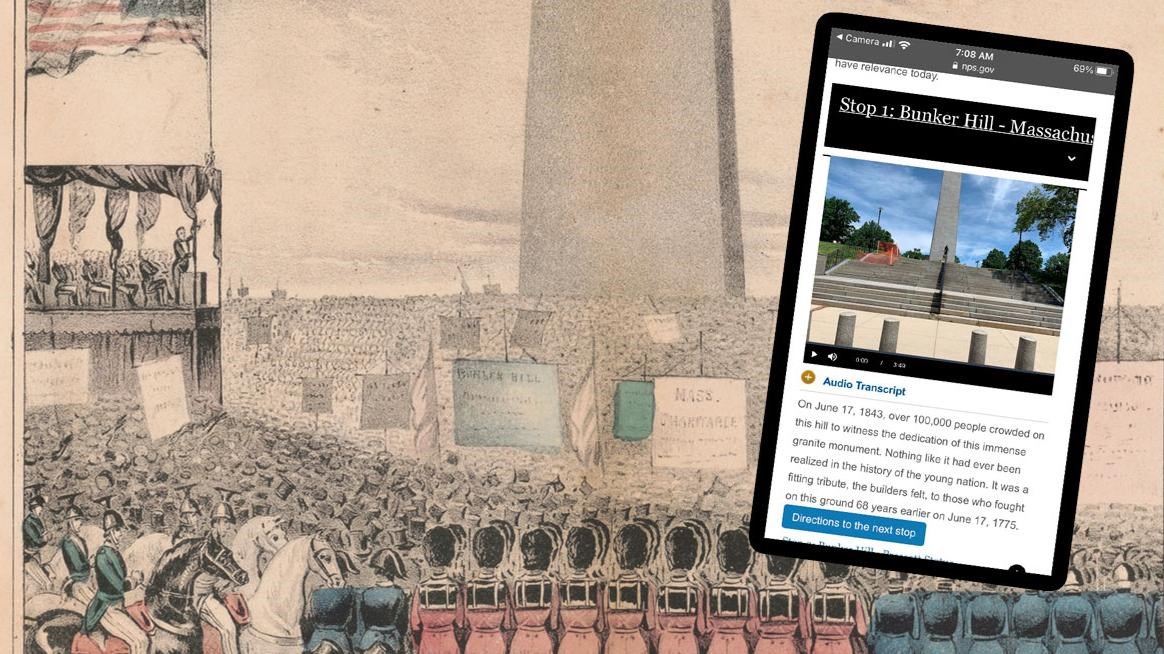
Dive into the history and memory of the Battle of Bunker Hill through this audio tour. This self-guided audio tour is also available on the free NPS app! You can download this tour ahead of your visit and listen along as you walk through Boston. Total run time of all 7 audio clips: 29 minutes, 11 seconds. Download this tour and discover many more using the free NPS App!How to find Remembering Revolution on the NPS App
Learn More...To explore more stories related to the Battle of Bunker Hill and the Bunker Hill Monument, visit our webpage on Bunker Hill. Peter BrownPeter Brown wrote a letter to his mother, Sarah Brown, on June 25, 1775. This letter provides his first-hand account of his experience at Bunker Hill. "Letter from Peter Brown to Sarah Brown, 25 June 1775." Massachusetts Historical Society. Accessed 2021. https://www.masshist.org/database/viewer.php?item_id=725&pid=2. Peter SalemPeter Salem's role in the Battle of Bunker Hill became a legend through records about his role during the battle. "Peter Salem Made History at Bunker Hill." Cleveland Call and Post. July 16, 1960. ProQuest Historical Newspapers. Swett, Sameul. The History of Bunker Hill Battle, with a Plan. 2nd edition. Boston: Munroe and Francis, 128 Washington-Street, 1826. GooglePlay. Temple, J.H.. History of Framingham, Massachusetts. Early Known As Danforth's Farms, 1640-1880 with a Genealogical Register. Town of Framingham, 1887. GooglePlay. Washburn, Emory. Topographical and Historical Sketches of the Town of Leicester: In the Commonwealth of Massachusetts: Furnished for the Worcester Magazine and Historical Journal. Leicester (Mass.): Rogers & Griffin, 1826. GoogleBooks. Lt. John WallerAfter surviving the Battle of Bunker Hill, Lt. John Waller wrote two letters one on the June 21 (recipient unknown) and one on the June 22 (to his brother Jacob). Waller's eyewitness accounts provide surprising insight into the British perspective of this battle. "Letter from J. Waller to unidentified recipient, 21 June 1775." Massachusetts Historical Society. Accessed 2021. www.masshist.org/database/viewer.php?item_id=726&pid=39. J. Waller, "British Account of Bunker Hill." Teaching American History. Accessed 2021. https://teachingamericanhistory.org/document/british-account-of-bunker-hill/. Other Sources"Bunker Hill Celebration." Liberator. July 21, 1843, 2. Dearborn, Henry, and Daniel Putnam. An Account of the Battle of Bunker's Hill. Boston: Munroe & Francis, 1818. HathiTrust. Declaration of Sentiments of the Colored Citizens of Boston, on the Fugitive Slave Bill!!! Broadside. c. October 5, 1850. Boston Athenaeum. Accessed 2023. https://cdm.bostonathenaeum.org/digital/collection/p16057coll37/id/1292/. F. M. A. "Large-minded Lucy Stone." The Woman's Journal Vol. 24, no. 43. October 28, 1893. "Frances (Appleton) Longfellow to Isaac Appleton Jewett, 9 September 1840." National Park Service. Longfellow House-Washington's Headquarters National Historic Site. Archives Number 1011/002.001-010#022. https://npgallery.nps.gov/AssetDetail/8114ae8a-85cd-4c7d-a98b-b58328701f77. "McGuire Asks Return to Ideal of Bunker Hill." The Boston Globe. June 17, 1942. 15. "Theodore Parker to George Bancroft." March 16, 1858. In John Weiss, The Life and Correspondence of Theodore Parker. London: Longman &c., 1863. 235. Archive.org. Warren, George Washington. The History of the Bunker Hill Monument Association During the First Century of the United States of America. Boston: James R. Osgood and Company, 1877. Internet Archive. Johnson, Arthur, and Bestor Cram. "'...to glorify life'" The Boston Globe, May 23, 1971. "What is the Lesson of Bunker Hill for the Adopted American?" The Boston Globe. June 16, 1901. 30. Webster, Daniel. The Orations on Bunker Hill Monument: The Character of Washington and the Landing at Plymouth. New York: American Book Company, 1894. GoogleBooks. |
Last updated: January 2, 2025
